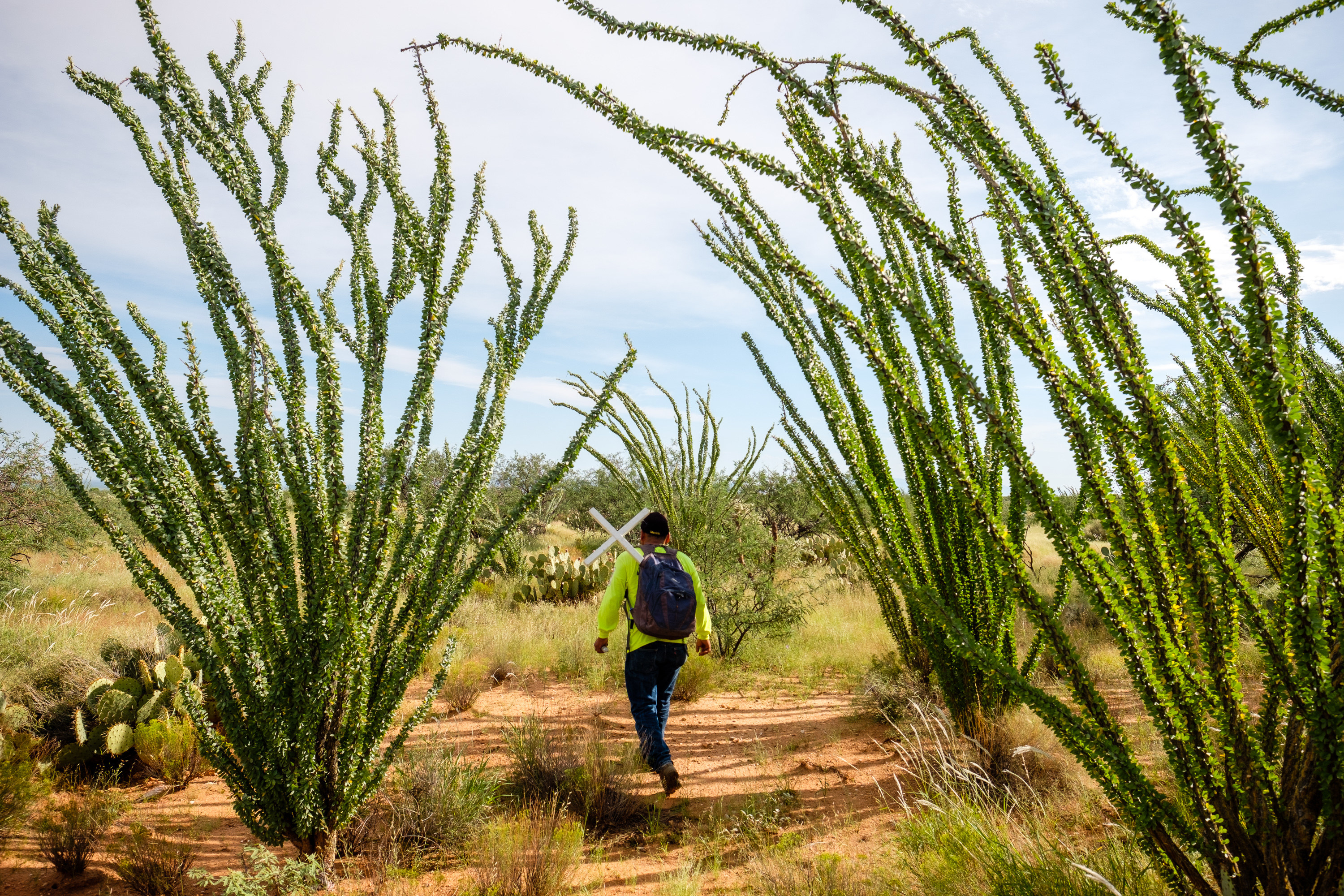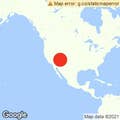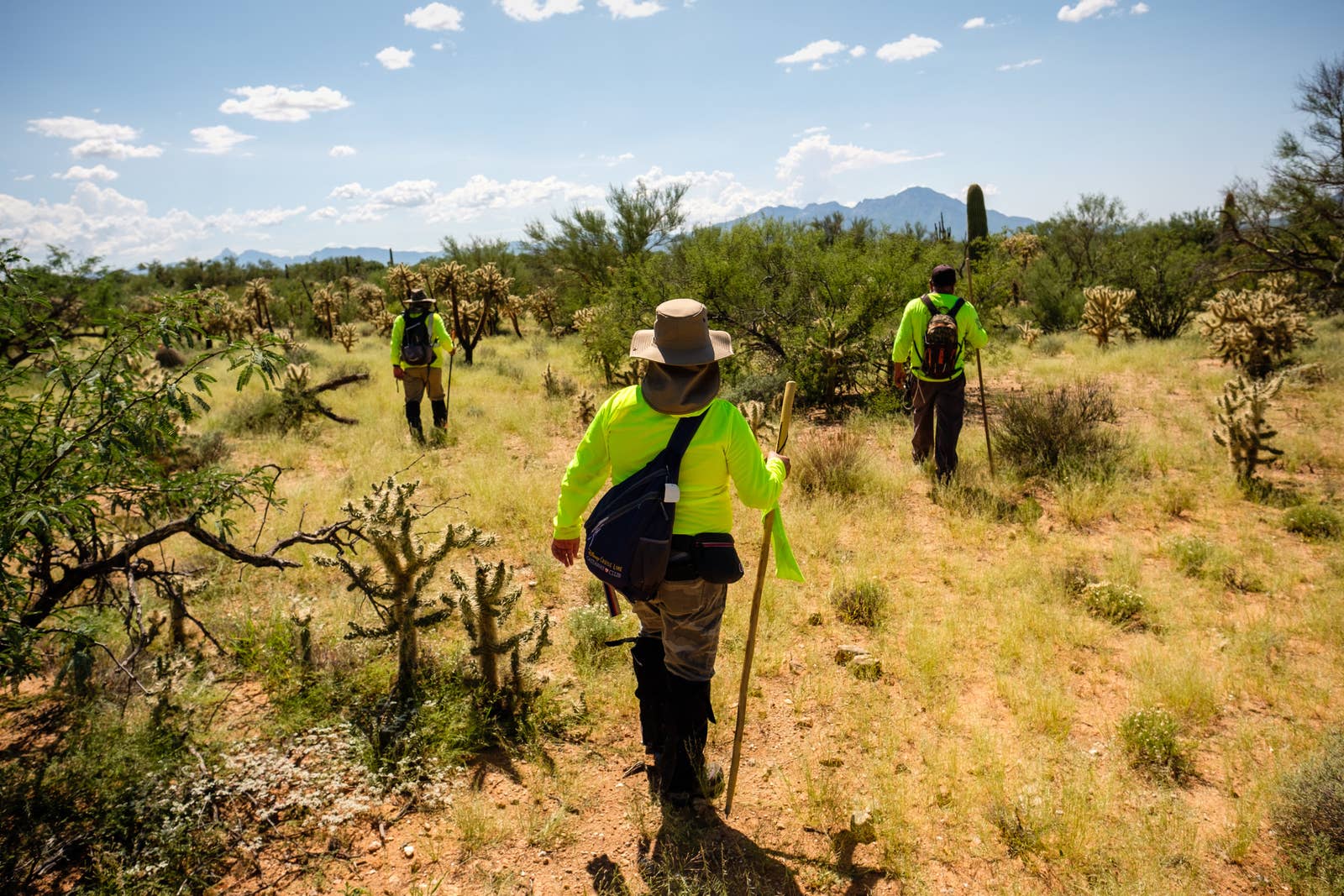
THREE POINTS, Arizona — With three miles to go and the unrelenting Arizona desert sun beating down on them, the search team headed in the direction of two vultures circling ahead, a sign that could lead them to the missing immigrant they were looking for.
Using a far-off mountain peak as a point of reference and a general idea of where the man was last seen, the members of Aguilas del Desierto, or Eagles of the Desert, marched forward in a horizontal line. Irvin, who had traveled to the border from the Mexican city of Puebla, had been missing for 10 days. At this point, they were searching for a body so they could at the very least give Irvin’s family some sense of closure.
During the week, Aguilas del Desierto volunteers work on farms, as teacher’s aides, and as medical assistants. But on certain weekends, they search for the missing along the US–Mexico border. Many of them were once undocumented themselves, and some made similar journeys across the border.
Among them was Francisco Gonzalez, a middle-aged man who earns money picking fruit and vegetables in Southern California. Years ago he sold fruit to Ely Ortiz, the president of Aguilas del Desierto, and learned about their operation. At the time he was undocumented.
“If one day I get my papers, I want to join you,” Gonzalez said he told Ortiz at the time. “I had big dreams of joining them because what they did was so beautiful to me.”
In 2018, Gonzalez became a US resident and almost immediately started volunteering with Aguilas del Desierto. Sometimes his family will give him a hard time for leaving them to go on searches, but when Gonzalez doesn’t go, he stays up at night wondering if he was meant to find the missing person.
Friends and strangers will tell Gonzalez that he’s crazy, but it doesn’t get to him. One day it could be your family or friend who is lost out there and you’ll call us for help, Gonzalez tells them. Pointing out to the desert, he said he crossed the border with his wife many years ago and had to sleep out in the open for days.
“For migrants, the desert can be very sad because of what we suffer,” Gonzalez said. “But it’s also something beautiful because you’re crossing with nothing but the clothes on your back and the hope that something better lies ahead.”
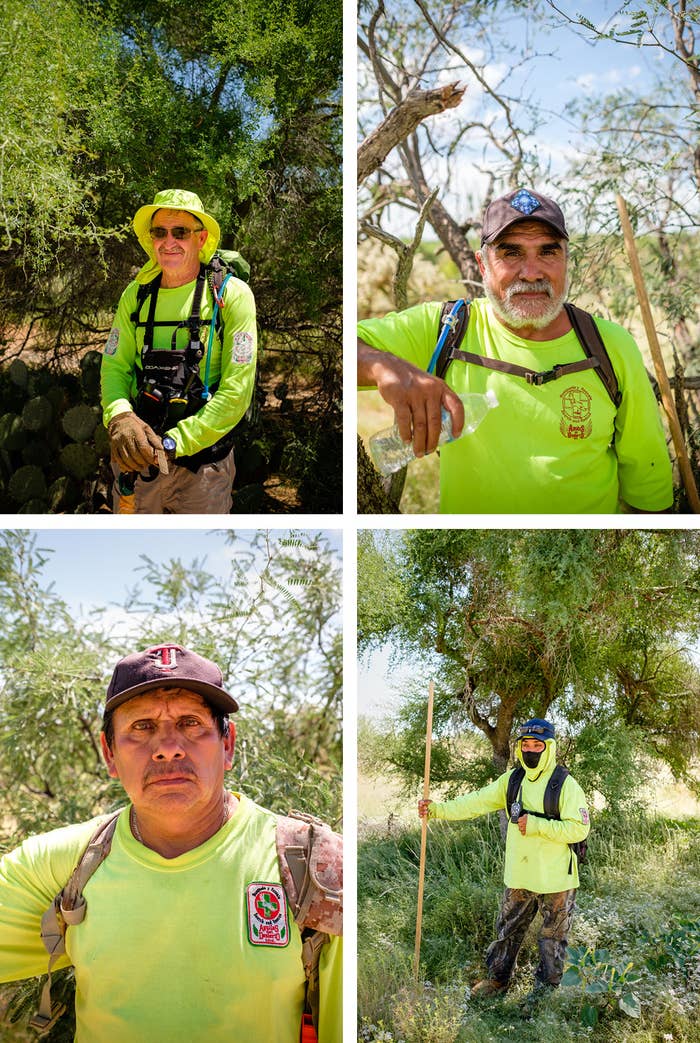
Aguilas del Desierto receives up to 50 calls a day from families whose loved ones have gone missing in the desert, often abandoned by their smuggler. Before the group commits to a search, they have to make sure the missing person isn’t being detained by US immigration authorities or hasn’t been deported. Otherwise, they will share as much with US Border Patrol about where the person was last believed to be, using information from other immigrants or location details sent by the lost person. If US authorities don't find them, Aguilas at the very least has a starting point for the search.
If Aguilas searchers find the person alive, they give them water, food, and a choice: Do they want to continue on their own or call Border Patrol for help? As much as it pains him, Ortiz, the president, said the organization can’t transport the person themselves — that would be crossing a line, and if they’re caught, US authorities would never let them continue their work.
“It’s cruel and it’s painful because some walk seven or eight days and we allow immigration to take our people,” Ortiz said. “But if we put someone in our truck, we’d be accused of human trafficking and our mission is over.”
Even if a missing person is taken into Border Patrol custody, at least they’re alive and can try again, rather than die like so many others in the desert, he added.
So far in fiscal year 2021, Border Patrol has found the remains of 383 immigrants near the border. The figure surpassed 2020's total of 253 and is the highest since 2013, when agents found the remains of 451 immigrants. Border Patrol has also made 10,528 rescues so far this fiscal year, compared with 5,333 in 2020.
Advocates point to increasing physical barriers, like the border wall, and hardline policies as the reason desperate immigrants are taking more dangerous and remote routes in order to avoid detection. Last month, the Biden administration renewed a Trump-era border policy that sends back most immigrants to Mexico or their home countries. At the same time, US border authorities blame callous smugglers who are only interested in making money and leave immigrants behind to die.
Meanwhile, for Ortiz, the job never ends. His phone rings 365 days a year, 24 hours a day, and he always picks up. They’re difficult calls, sometimes coming from the lost immigrants themselves. One of them was a woman who was recently lost in the Texas desert. The woman said she couldn’t take it anymore, and Ortiz asked her to send her location information so he could call for help. But fearing being deported back to Mexico if she was found, the woman told Ortiz that perhaps it was better if she died in the desert than return to the life she was fleeing, one that included threats from an abusive ex-husband and little support.
Ortiz told her to fight for her kids because they needed her and begged her to send her location. She finally relented and sent Ortiz a photo of her surroundings to help the rescue team. In the foreground was the woman’s face, her dry lips cracking and bleeding from one side. He stayed on the phone with her until the ambulance arrived.
“It’s hard to step away because thinking that I may miss a call like that or not give it my full attention fills me with dread,” Ortiz said.
But the work has taken its toll. Ortiz has had two spinal surgeries and was momentarily paralyzed. After a month in a rehabilitation center, he spent another four months in a wheelchair. Even so, he continued coordinating searches from his computer.
“This isn’t a job you can stop and start up whenever you want — it’s a commitment,” Ortiz said.
He got involved in searching for missing immigrants after his brother and cousin went missing along the Arizona border in 2009. That’s when he learned how difficult it was to get help from consulates and Border Patrol. Ortiz linked up with a group to search for his brother and cousin, but by the time they found them, they were dead.
The searchers didn’t find Irvin on Saturday, discovering only the things discarded by immigrants who had made the same journey: water bottles, backpacks, and old clothes.
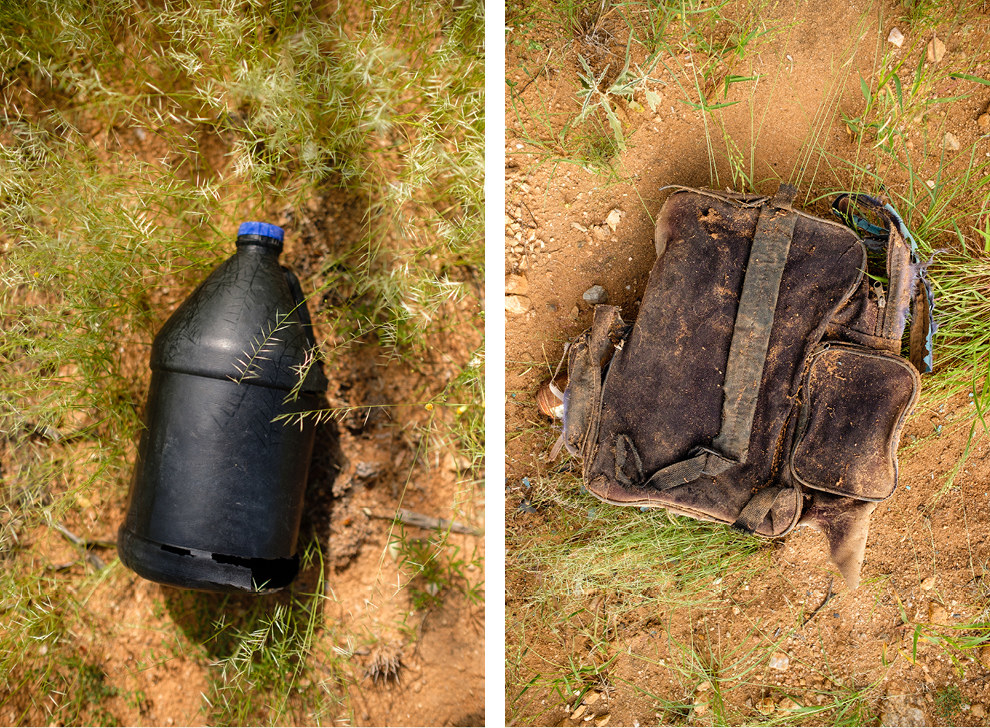
Aguilas del Desierto was recently able to obtain a piece of land in Ajo, Arizona, where they can camp out after a search. On Saturday evening, the group ate chicken tacos and tostadas in the shade, trading jokes and stories from the day. The organization also exchanged advice with Capellanes del Desierto, or Desert Chaplains, a Tucson-based group that wants to learn how to conduct their own searches.
At a nearby table, Ortiz pored over a map, planning the next day’s search for Warner, another missing man from Mexico, using the little information his family had provided. But from what Ortiz could gather, Warner was somewhere on the property of a US military base.
In 2020, Ortiz said Aguilas del Desierto discovered the remains of 28 people, more than any previous year, and found 45 people alive. So far this year, they’ve found the remains of eight people, which Ortiz attributed to not being granted access to areas where there could be more.
Sometimes the most difficult job is getting permission from landowners to conduct searches. The pandemic has made it worse because Native American reservations, which were hit hard by the virus, won’t give them access now in an attempt to stem infection rates by keeping outsiders away, and it can take weeks to get permission from a military base.
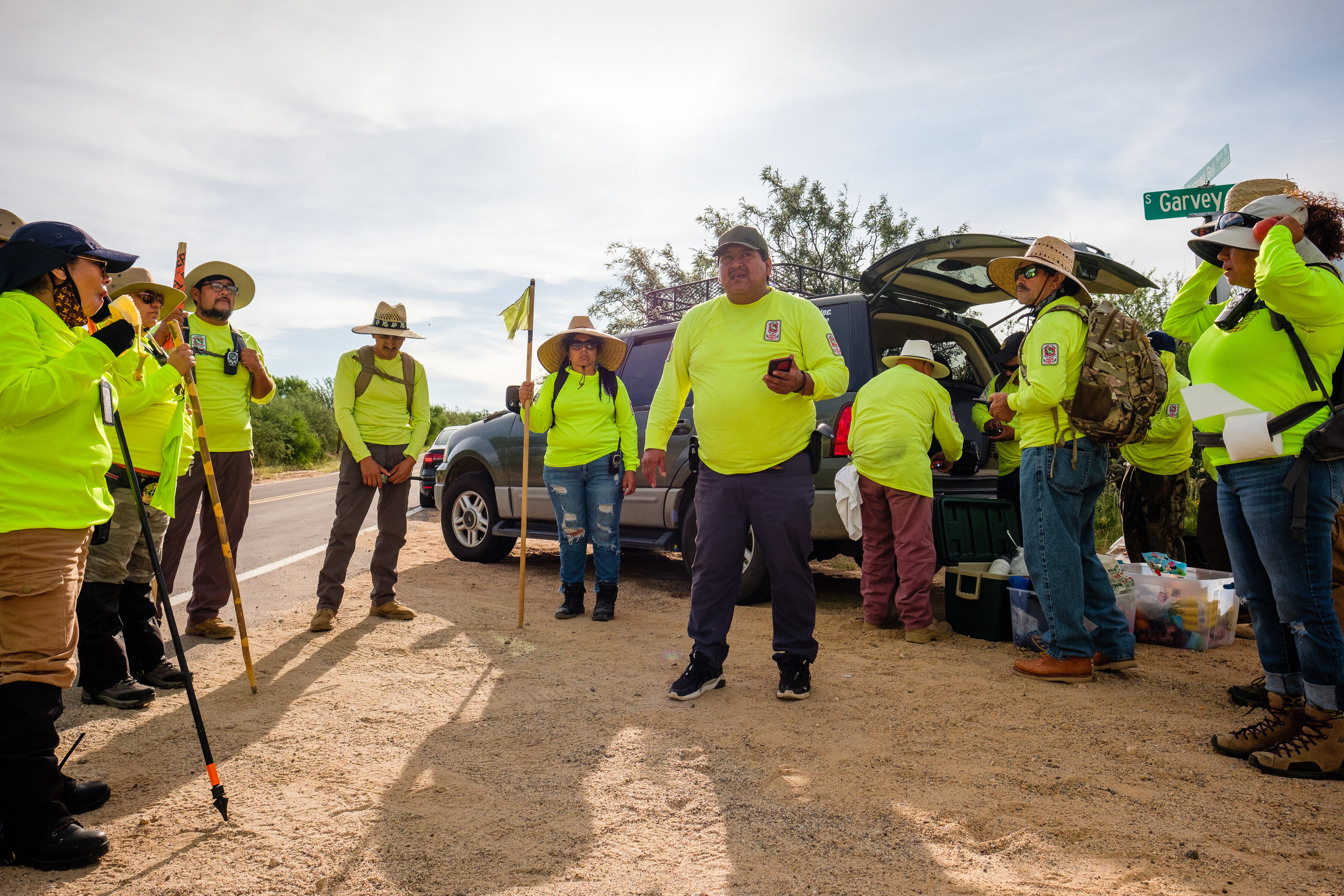
“We don’t have a lot of access to the military bases, where in the previous years we found a lot of bodies,” Ortiz said.
The group was able to get permission to access only a part of the land they wanted to search for Warner on Sunday. Unlike the previous day, the terrain was dry and the heat more intense. The group fanned out, making sure they didn’t break the line by staying in contact on walkie-talkies as they searched dry riverbeds and steep rocky hills. Again, the volunteers didn’t find the person they were looking for. Ortiz worries Warner was on nearby property Aguilas couldn’t get access to.
Aguilas has also been getting more calls about missing immigrants in Texas, some of them families with small children — which is uncommon in California and Arizona, where most of the people they search for are single adults.
Christina Otero, who recently moved from San Diego to a community outside Dallas, has been charged with establishing a group of volunteers in Texas. Otero met Ortiz and his wife, Maricela through their daughters and started to join searches.
She was hesitant at first, but Otero saw how Aguilas helped people, and as a former immigrant herself who had crossed the border illegally, she understood the call for help.
“Most of the people in the group are immigrants who went through the same paths as the people we search for,” Otero told BuzzFeed News. “We know how they suffer.”
Otero will never forget the first time she saw the remains of a person they were searching for — just the leg of the missing young man with a shoe and a piece of his skull. The rest of his body had been scavenged by animals.
“It’s very sad when we find remains, but at the same time it can be good because we are able to give the family some consolation,” Otero said. “But when we find people alive, you're filled with joy because you know they’re leaving the desert alive.”
On a recent weekend, as Otero and others were asking for the donations they depend on to operate the searches, several people went up to the group to thank them for finding family members.
“A young woman came up to me and said, ‘My brother is alive because of Aguilas,’ and hearing those words is what keeps me going,” Otero said. “This isn’t charity, it’s a service.” ●
